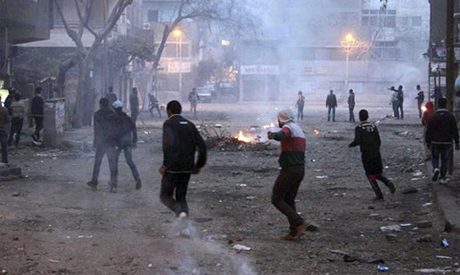
Smoke fills the area during clashes between supporters of former president Mohamed Morsi and riot police in Cairo January 17, 2014 (Photo: Reuters)
A government committee formed to investigate events in Egypt since last year's ouster of president Mohamed Morsi will release its final report by the middle of November.
Judge Omar Marwan, secretary-general of the committee, confirmed that there will be no leaks or initial indications of the report's contents before it is submitted to the president, Al-Ahram's Arabic website reported.
On Sunday, a member of the committee, Fatma Khafagi, said the findings will be announced at an international press conference.
She explained during an interview with Al-Arabiya TV that the committee relied on a large number of documents and extensive interviews with eye witnesses as well as officials to reach an accurate analysis of the events.
She said two-thirds of the report has already been finished.
According to Khafagi, the committee researched 11 incidents, including the 30 June 2013 protests that led to Morsi's ouster and the violent dispersals of the pro-Morsi Rabaa Al-Adaweya and Nahda sit-ins in Cairo, where hundreds died.
In August, the New York-based Human Rights Watch issued a detailed report on the anniversary of the Rabaa dispersal in which it said Egypt's government used "lethal force" against the pro-Morsi demonstrators, in violence that likely amounts to "crimes against humanity".
Other items in the committee's report include the 8 July 2013 clashes in front of the Republic Guard headquarters, near the Rabaa sit-in, when at least 51 Morsi supporters died, as well as events in North Sinai, where an Islamist militant insurgency has picked up steam since summer 2013, and attacks on churches in Upper Egypt in the aftermath of Morsi's removal.
She described the report as an "unpoliticised technical human rights report".
Interviews were conducted with Muslim Brotherhood eye witnesses, Khafagi explained.
She stressed that the committee has concluded that there is no torture in Egyptian prisons, where "human rights norms are being considered".
Allegations of police abuse inside prisons have increased since Morsi's ouster, with both Islamists and secular activists detailing accounts of torture, including sexual assault.
In June, London-based human rights group Amnesty International said that torture in Egypt remains "endemic," with mounting reports of torture and other ill-treatment of detainees that "harkens back to the most abusive periods under Hosni Mubarak."
Egypt's President Abdel-Fattah El-Sisi on Sunday received representatives of the fact-finding committee, who handed him parts of the report concentrating on Sinai.
The report includes a number of recommendations to develop the turbulent border area.
Formed by interim president Adly Mansour in late 2013, the fact-finding committee is headed by Fouad Abdel-Moneim Riyadh, a former international judge and law professor, and consists of three law professors and a representative from the National Council for Women.
Short link: